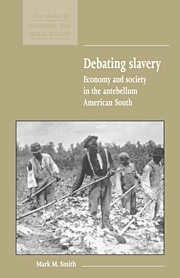Book contents
- Frontmatter
- Contents
- List of figures
- List of tables
- Preface
- 1 The contours of a debate
- 2 Slaveholders and plantations
- 3 Yeomen and non-slaveowners
- 4 Slaves
- 5 The profitability of slavery as a business
- 6 The Profitability of slavery as a system
- 7 New directions, toward consensus
- Bibliography
- Index
- Economic History Society
- New Studies in Economic and Social History
- Studies in Economic and Social History
1 - The contours of a debate
Published online by Cambridge University Press: 05 June 2012
- Frontmatter
- Contents
- List of figures
- List of tables
- Preface
- 1 The contours of a debate
- 2 Slaveholders and plantations
- 3 Yeomen and non-slaveowners
- 4 Slaves
- 5 The profitability of slavery as a business
- 6 The Profitability of slavery as a system
- 7 New directions, toward consensus
- Bibliography
- Index
- Economic History Society
- New Studies in Economic and Social History
- Studies in Economic and Social History
Summary
Even at its height in the first half of the nineteenth century, Americans debated slavery. Was it a profitable, progressive, and healthy institution? If so, for whom? For slaveholders in particular? For non-slaveowners? For slaves? For the southern economy generally? (Woodman, 1963; 1972) Was the Old South an acom-mercial region, populated by premodern slaveowners and less than diligent slaves? The constitutional abolition of slavery in the United States in 1865 did not end this debate. Similar and sometimes identical questions concerning the economic and social character of antebellum southern slavery still inform modern historical debates which have raged with increasing volume and occasional acrimony in the twentieth century. Today, southern slavery is among the most hotly discussed topics in writings on American history and southern history generally, and has attracted the attention of scholars from many countries (Parish, 1989; Adeleke, 1993; Ide, 1993; Salmond, 1993; Wood, 1993). The aim of the present study is to outline the main contours of the debates, summarize the contending viewpoints, and weigh up the relative importance, merits, and shortcomings of these various and competing interpretations. The study concludes by sketching one way in which ostensibly mutually exclusive interpretations of the Old South may be rendered and, in fact, are in the process of rendering themselves, more compatible.
Before sketching the outlines of these debates, it is perhaps helpful first to say a few words about the history of the Old South and, second, to suggest why the debate over slavery has been so important to Americans generally and to historians of the American South in particular.
- Type
- Chapter
- Information
- Debating SlaveryEconomy and Society in the Antebellum American South, pp. 1 - 14Publisher: Cambridge University PressPrint publication year: 1998



